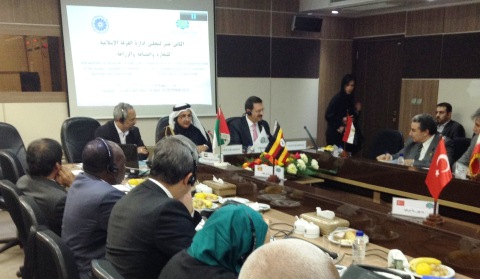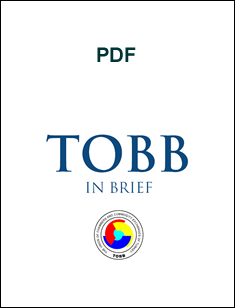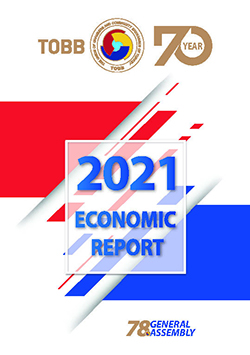“As Islamic countries, we are unable to fully realize our potential”

30.10.2013 / Tahran / İran
The Vice President of the Islamic Chamber of Commerce, Industry and Agriculture and the President of TOBB M. Rifat Hisarcıklıoğlu and the TOBB Board Vice President İbrahim Çağlar attended the 18th Board Meeting of ICCIA, 15th Private Sector Meeting, 7th Businesswomen Forum, D-8 Federation of Chambers of Commerce and Industry (FCCI) as well as the 14th Trade Fair.
Speaking at the Private Sector Meeting, ICCIA Vice President and TOBB President Hisarcıklıoğlu stated that these meetings are unique opportunities for the Islamic business world to improve their cooperation and that it is necessary to use these platforms in the most effective manner to advance commerce and economic relations between Islamic countries.
Reminding that, as Islamic countries, they have access to great riches, Hisarcıklıoğlu said, “However, our performance has failed to carry us to the forefront of the race for development in this century. Our joint goal is to become countries which have integrated fully to the global economy, having reached their millennial development goals, having embraced the post-2015 approach of the United Nations and using their abundant natural resources to the benefit of the region and its people.”
Stating that as long as unity and solidarity is maintained, prosperity and wealth will endure, Hisarcıklıoğlu said, “I invite all of my brothers here to embrace each other around this idea. We must strengthen the cooperation between us.”
- “It saddens to me to be reciting these figures”
Stating that in the post-2009 global crisis world, both the balance of power and the financial environment have begun to shift, Hisarcıklıoğlu went on, “Islamic countries which harbor great economic potential, being comprised of 57 countries spread over 4 regions; a sixth of the world’s land; a quarter of the world’s population; 65% of the world’s oil reserves as well as 60% of the world’s natural gas reserves.
However, our share of the world’s economy is only 11%. This means that we are unable to actualize our potential as Islamic countries. We are unable to fully benefit from the riches we have been handed.
The richest and the poorest Islamic countries differ in terms of prosperity by a factor of 220 while 21 Islamic countries are among the least developed countries in the world. 73% of exports are conducted from only 10 of the Islamic countries. It saddens me to be reciting these figures. These figures are all of our responsibility.”
Stating that petroleum and natural gas only enrich governments, Hisarcıklıoğlu said that what provides the people with prosperity is a qualified workforce, investment and commerce and underlined the fact that in order to achieve these, the business and investment environment needs to be improved.
Touching on the issue of bureaucratic obstacles regarding such matters as visa, customs and work permits, Hisarcıklıoğlu said, “We always say that we are brothers. But we haven’t even overcome the visa and customs obstacles among ourselves. Does a man ever need a visa to visit the house of his brother. We have been unable develop the rules of joint trade. We are unable to successfully apply the joint customs systems active throughout the world.”
Hisarcıklıoğlu lamented that the Trade Preferential System among the Member States of the Organization of the Islamic Conference (TPS-OIC) has yet to be implemented and that, unless it is implemented soon, they will be left out of the global economy.
Touching on the matter of the Historical Silk Road Project, Hisarcıklıoğlu said, “Today 22% of the world’s total foreign trade volume of 30 trillion USD takes place in Silk Road countries. The Silk Road should be the world’s greatest trade route. Many of us are countries located on this route. The project is not limited to the countries which are situated on the east-west stretch of the Silk Road route.
This also includes the multiple modes of transportation connecting Europe, Asia and Africa stretching from the north to the south. We must make efforts to revitalize the Silk Road with railways, land transportation routes, energy corridors, gas lines and highways. That is how our region will become the commerce center of the global economy. The strategic status of our region will provide us and our people with prosperity and riches.”
- ICCIA Board Meeting
Attending the 18th Board Meeting of the Islamic Chamber of Commerce, Industry and Agriculture (ICCIA), Hisarcıklıoğlu, stated that the trade between Islamic countries was insufficient, that the Islamic business community needs to contribute to the formation of economic policy.
Hisarcıklıoğlu stressed the urgent need for the implementation of bilateral and multilateral trade agreements as well as the abolishment of obstacles to commerce.
Hisarcıklıoğlu said, “Despite having access to a sixth of the world’s land as well as a quarter of the world’s population in addition to a sizable portion of the world’s petroleum and natural gas resources, countries of the Organization of the Islamic Conference are unable to realize their full potential.”
The Islamic Chamber Strategic Document was assessed during the meeting and it was decided that a five year action plan to develop the strategy document in order to strengthen the bond between Islamic countries and ICCIA’s structure.
Attending the meeting were delegations from Iran, Pakistan, Jordan, UAE, Uganda, Nigeria, Kuwait, Egypt, Iraq, Niger, Oman, Palestine, Qatar and Sudan.
- Cooperation Committee to be established
ICCIA Vice President and TOBB President Hisarcıklıoğlu, as a part of his contacts with Iran, met with the Iran Chambers of Commerce Industry and Mines as well as the Chief of Staff of the President of Iran, Mohammed Nahavandi.
During the meeting, the deep bonds of friendship were touched upon stressing the need to cooperate in tangible fields such as tourism and transportation in bilateral and multilateral relations. It was agreed that the custom gate modernization project should be considered.
It was decided that a joint committee would be established to work on the “Historical Silk Road” project.
- The preferential trade agreement must be enacted posthaste
Hisarcıklıoğlu attended the ICCIA meeting held with the Chief Deputy Prime Minister of the Islamic Republic of Iran, İshak Cihangiri. Speaking at the meeting, Hsiarcıklıoğlu stressed the importance of abolishing the obstacles to trade between Islamic countries and asked for Iran’s support for enacting the preferential trade agreement among Islamic countries posthaste.
Emphasizing that they are unable to fully actualize their potentials as Islamic countries, Hisarcıklıoğlu stated that they are conducting a joint study to restructure the vision of ICCIA.
- Trade and economic relations of the D-8 countries assessed at the FCCI
Meanwhile, TOBB Board Vice President İbrahim Çağlar attended the D-8 Federation of Chambers of Commerce and Industry (FFCI) meeting. The meeting wherein the trade and economic relations between D-8 countries was assessed, the activities which the FCCI needs to partake in were discussed.
Your message has been sent
Thank you |



















